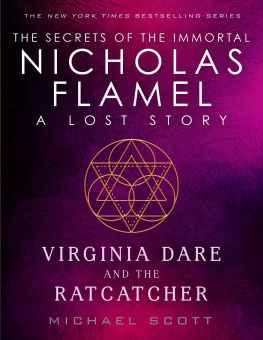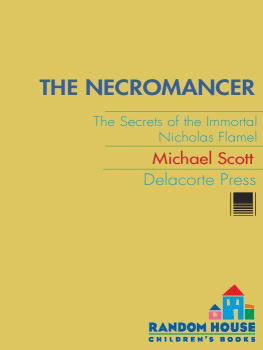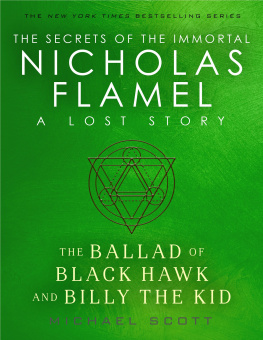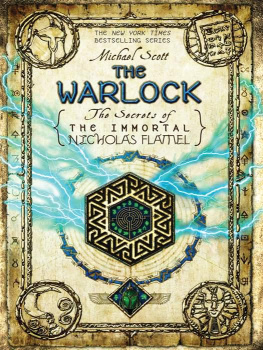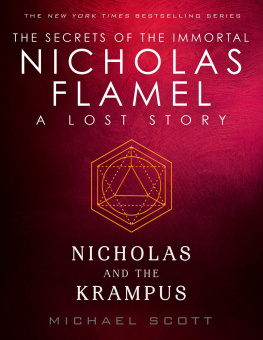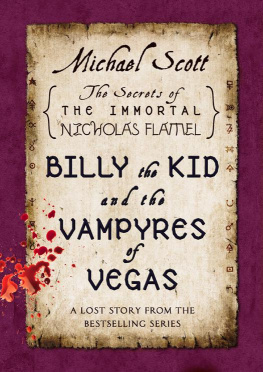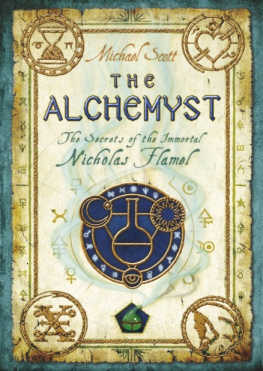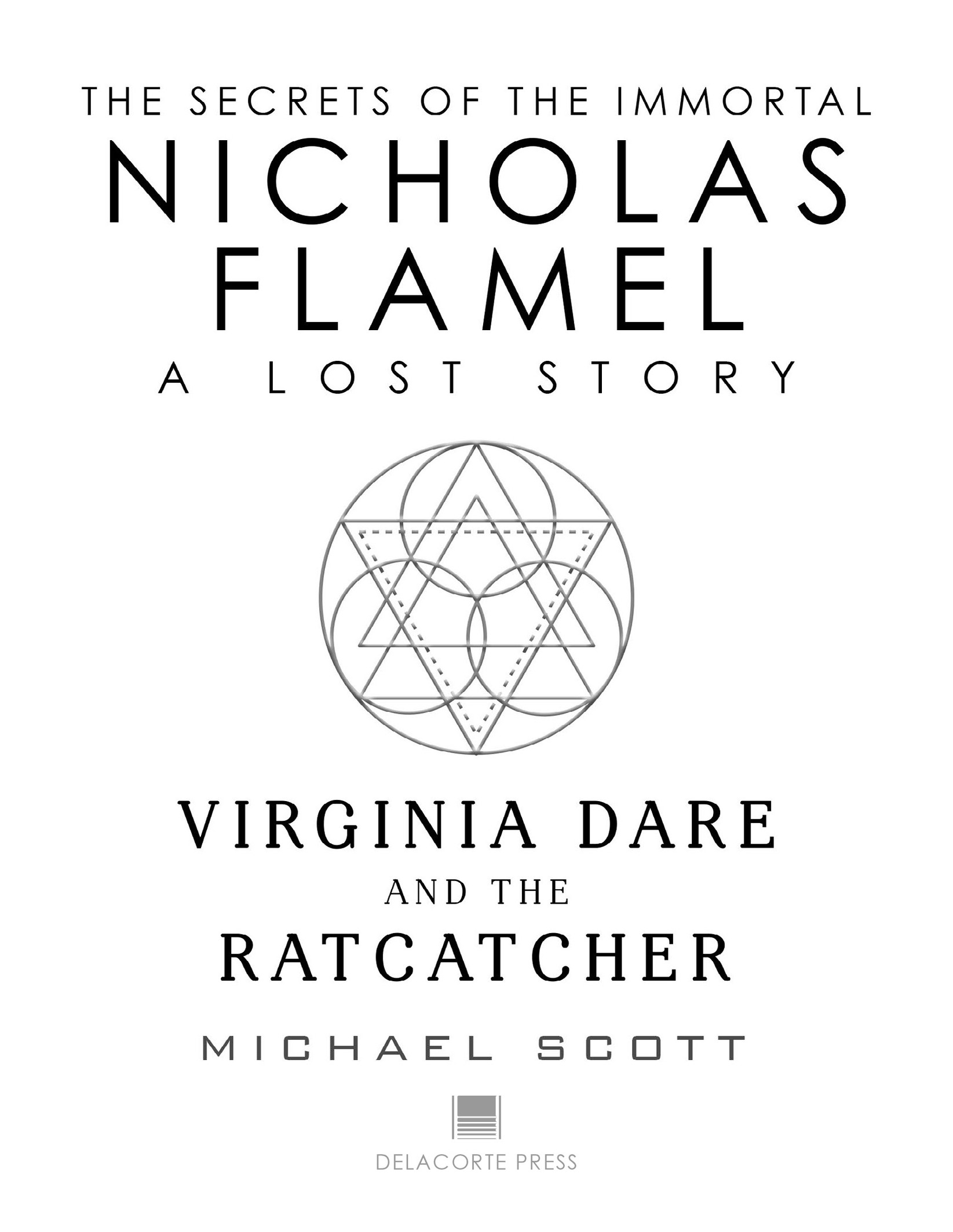Contents
Landmarks
Print Page List
This is a work of fiction. All incidents and dialogue, and all characters with the exception of some well-known historical and public figures, are products of the authors imagination and are not to be construed as real. Where real-life historical or public figures appear, the situations, incidents, and dialogues concerning those persons are fictional and are not intended to depict actual events or to change the fictional nature of the work. In all other respects, any resemblance to persons living or dead is entirely coincidental.
Text copyright 2021 by Michael Scott
Cover image used under license from Shutterstock.com
Cover design by Regina Flath
All rights reserved. Published in the United States by Delacorte Press, an imprint of Random House Childrens Books, a division of Penguin Random House LLC, New York.
Delacorte Press is a registered trademark and the colophon is a trademark of Penguin Random House LLC.
Visit us on the Web! GetUnderlined.com
Educators and librarians, for a variety of teaching tools, visit us at RHTeachersLibrarians.com
Library of Congress Cataloging-in-Publication Data is available upon request.
Ebook ISBN9780449819210
Random House Childrens Books supports the First Amendment and celebrates the right to read.
Penguin Random House LLC supports copyright. Copyright fuels creativity, encourages diverse voices, promotes free speech, and creates a vibrant culture. Thank you for buying an authorized edition of this book and for complying with copyright laws by not reproducing, scanning, or distributing any part in any form without permission. You are supporting writers and allowing Penguin Random House to publish books for every reader.
ep_prh_5.6.1_c0_r1
Contents
To my most esteemed colleague, friend, and mentor, Dr. Dee,
I am in receipt of your most recent letter and funds. Your comments on my latest writing, which I have decided to call The Narrative of Arthur Gordon Pym, are insightful, and I will endeavor to incorporate your suggestions into the final manuscript. The work was inspired, as you are no doubt aware, by recent events. As I attempted to make sense of all that occurred and all that I saw, I realized I should create a narrative for myself, and for you, inasmuch as it intimately involves that most mysterious of women, Virginia Dare, whom I know you hold in the highest of regard.
My narrative begins in the month of November, in the year of Our Lord 1833, in Boston.
I had just won the most extraordinary sum of fifty dollars for my short story, MS Found in a Bottle, which was published by the Baltimore weekly the Saturday Visiter. (You will recall that you were generous in your praise of the work; I have taken the liberty of posting a copy to your London address.) My success brought me to the attention of some people of note, and there is the chance of employment on a quality newspaper or magazine in the near future.
One of the unexpected consequences of my newfound fame is that people who heretofore ignored me now seek me out. They are happy to ply me with food and drink as they regale me with their own stories. Everyone, it seems, wishes to become an author, though few wish to write themselves and prefer others do the tedious work for them.
In a rather low-class drinking house on the Boston docks, I was first told the story which served as the catalyst for all that was to come.
Edgar Allan Poe
Boston
December 1833
1
The only light in the uncomfortably cool room came from the low, dying fire. Coals were dusted white with ash, and logs were little more than hollowed-out shells, suggesting that the fire had been unattended for a very long time.
The small, wild-haired man standing at the hearth noted the unusual way the logs had been set: in a half circle pointing upward, almost like a campfire. It took an enormous will not to pull a scrap of paper from his pocket and record a note of the placement. It would make an interesting detail in a story. And something else to note was that the clock on the mantel had stopped, both hands settling on the twelve. A stopped clock is correct at least twice every day; hed read that once. Maybe he could do a story about a stopped clock.
He turned his back to the fire and looked around the shadow-wrapped room. He had been here twice before, and on each occasion it had been subtly different. Furniture was almost, but not quite, where it had been previously, and pictures hed remembered on one wall were now on another. And although this was a substantial property in the best part of Boston, hed only ever encountered one servant. He thoughtthough he could not be entirely surethat it was the same man. English, perhaps, but with a hint of the Gael to his accent, a suggestion of red in his gray hair. Only now he realized that the man hed seen today seemed much younger, his hair a bright copper, and Poe momentarily assumed he was the elder servants sonexcept both men had an identical tattoo on the back of their wrists, and the merest hint of a scar along their jawline.
As his eyes adjusted to the gloom he became aware with a start that he was not alone in the room. There was a figure in the high-backed chair to the left of the fire.
Or was it a shadow?
Squeezing his eyes shut, he looked away from the shape before opening them again. Lately, hed been plagued by shapes glimpsed from the corner of his eyes, speckles which sometimes took the form of skulls floating across his vision. He was terrified he was going to lose his sight, or worse: go mad.
No, there was definitely a figure in the chair. He could see the outline of a head, the hint of a face, the suggestion of arms and black-gloved hands.
Someone asleep? A dead body? It was not beyond the bounds of possibility; the last time hed visited this house, a delivery of mummies had just arrived from Egypt. They were lined up in the dining room like guests at a banquet.
He tried a polite cough. I do apologize. You must forgive my rudeness. I did not see you there.
The shape did not move.
Suddenly the fire behind him exploded into spiraling sparks. When he spun back, there was a second figure crouched before the grate, adding logs to the flames. Even before she turned to face him, he recognized the cascading sheen of jet-black hair.
Miss Dare His heart was thumping so hard it was difficult to form the words. I did not hear you come in.I was unaware that you were here.I thought
He turned back to the chair. The blazing firelight revealed that it was empty.
When he looked at the fire again, Virginia Dare was standing before it, tall, stern, hands clasped behind her back. Shockingly, she was wearing a mans black suit, and a white shirt with a black cravat. Her boots were so highly polished they reflected the firelight.
Miss Dare, he said again.
Mr. Poe.
Miss Dare
For a man who purports to make a living from his writing, you seem to be in possession of remarkably few words this evening. Virginia spoke English with the hint of a Boston accent, but touched by something else, some indecipherable twang. Thus far, all we have determined is that you remember my name.
You must forgive me. I was sure He checked the chair behind him again. I was sure you were sitting in that chair. So finding you behind me gave me a start. He rubbed his hands together and smiled in embarrassment. I saw a shadow.

